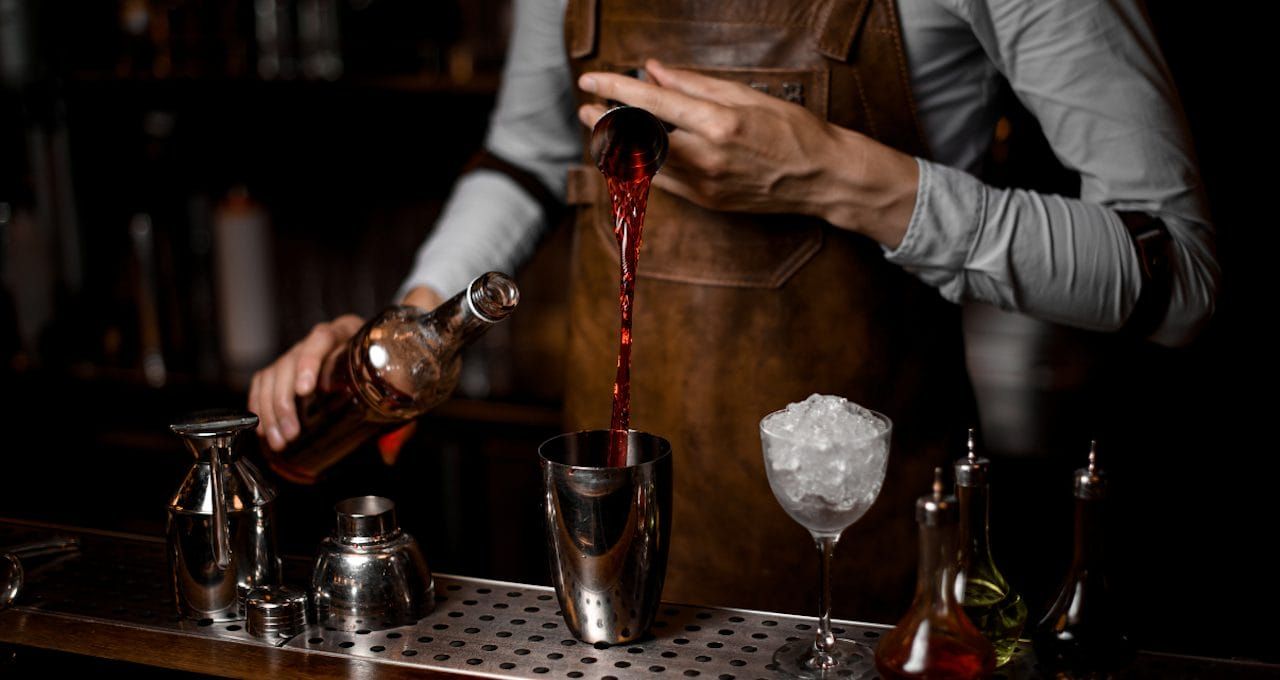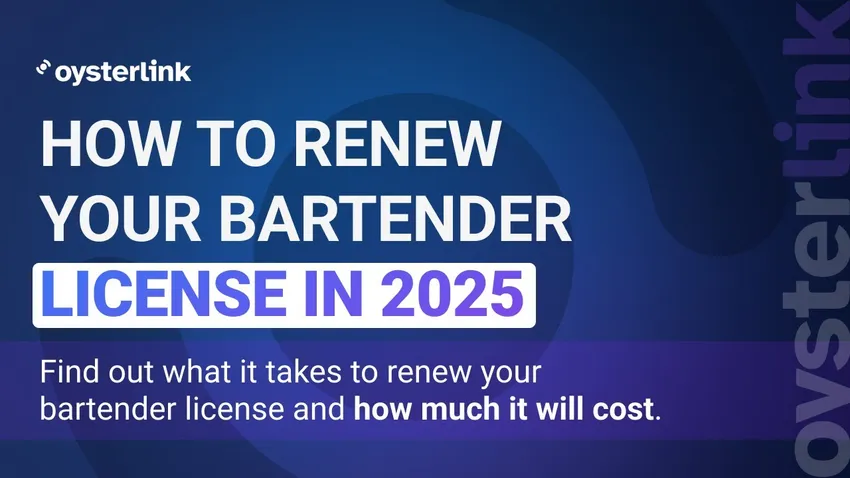Key Points:
- Renewing your license generally requires submitting personal identification and proof of completed training.
- Some states mandate the completion of a responsible alcohol service course or exam as part of the renewal process.
- Depending on your state, you may renew your license through government websites or approved training providers.
- Bartending license renewal periods differ across states, typically ranging from every two to five years.
Renewing your bartending license is an important step to remain compliant with your state’s laws and regulations for serving beverages behind the bar. You have to do it every few years and complete all the necessary steps in the process.
This article will show you how to renew your bartending license in the United States and ensure your Bartender career remains uninterrupted. If you prefer video format, here's a quick summary of what you can expect to read in this article.
Where Can You Renew Your Bartending License?
Where you can renew your bartending license depends on the state you’re based in. It’s important to understand that only some states in the U.S. require you to get a bartending license in the first place. In states where this is mandatory, there are multiple places where you can renew your license.
Most schools that offer training and grant you a bartending license can also renew it upon expiration. It’s also possible to renew your license directly through government websites, depending on your location.
What Do You Need To Renew Your Bartending License in the US?
Each state has its own requirements for renewing your bartending license. However, the process is usually similar and involves:
Meeting the Minimum Age Requirements
Before you can start the renewal process for a bartending license, it’s important to know if you meet the legal age requirements to bartend in the state where you work (or will be working). This helps ensure you’re eligible to continue working legally.
Every state sets its own minimum age, which could impact when and where you’re eligible to work in the industry. In general, the legal age to bartend ranges between 17 and 21 across the United States, with each state establishing its own regulations.
For more information, read our full guide on the Minimum Age To Be a Bartender in the U.S.
Some states also have varying age requirements based on the type of alcohol being served or the type of establishment. For instance, in Virginia, while Bartenders are generally required to be at least 21 years old, individuals who are at least 18 may sell or serve beer for on-premises consumption.
Another thing to keep in mind: Even if someone is old enough to serve or sell beer, wine and liquor, they may not be old enough to drink it. Let's say an individual is 18 years old and is bartending in Florida. Since they are still not 21 (the legal drinking age in the U.S.), they cannot drink any of the alcoholic beverages they prepare and serve as a Bartender.
Additionally, it's important to note that such regulations can change, and local ordinances may impose additional restrictions. Therefore, it's advisable to consult your state's alcohol beverage control board or relevant regulatory agency to obtain the most accurate and up-to-date information.
Understanding these age requirements is essential for both new and experienced Bartenders, especially if you’re relocating or planning to work in a different state.
Gathering Necessary Documentation
When renewing your bartending license, you have to fill out an official form for your state. This doesn’t take long and usually only includes filling in personal information.
Most often, this includes proof of identity such as a passport or driver’s license and other personal details. Depending on local laws and regulations, you may also have to link to a bartending course or school you attended and attach confirmation that you’ve successfully completed a program.
Completing the Required Training or Courses
Some states require you to complete a training program or course every time you renew your license. This ensures you’re knowledgeable about responsible alcohol service and up-to-date with local laws and regulations.
Most often, completing the required training or course when renewing your license doesn’t take more than a few hours. You can do it by passing an online exam regarding safe and responsible alcohol serving practices. These programs usually cover laws regarding liquor service, steps for recognizing fake IDs, handling intoxicated customers and more.

Some schools also offer practical training to improve your bartending skills. While this may help you be viewed as a more hireable candidate when applying for the role of a Bartender, it’s usually not required to complete such training to receive or renew your license.
Whether you’re renewing your current license or obtaining it for the first time, it’s important to complete a program that is compliant with your state’s licensing requirements. Make sure you check whether this is the case before applying.
See also: Bartending License vs Certification: Which Will Open More Doors for You?
How Often Do You Need To Renew Your License?
The frequency of bartending license renewals also varies by state and you may have to undergo the process every two to five years, depending on your location.
The table below shows for how long your license is valid in each state that requires it:
Once you first obtain your license, it’s important to check local laws and regulations and set reminders for yourself a few months before it’s set to expire.
Avoid any lapses in the renewal process to ensure nothing disrupts your ability to work legally as a Bartender.
Submitting Your Renewal Application
Once you fill out a form, it’s time to submit your renewal application. Keep in mind that renewing your bartending license comes with a fee. Therefore, you have to make sure you’ve made a payment before you submit your application.
The renewal fee also varies by state but typically ranges between $35 and $90.
Also, remember that some states (e.g., Hawaii, Idaho, Kentucky, Nebraska, New Jersey, North Dakota and Wyoming) have different laws and regulations regarding bartending licenses on county levels and the fee may not be the same in all of these.
Receiving Your Renewed Bartending License
After submitting your renewal application, you may have to wait from a few days to several weeks to receive your renewed license. That’s why most states recommend applying 30 days before your license is set to expire.
Still, it’s also possible to receive a temporary license or digital confirmation to continue working during the process.
Depending on laws and regulations in your state, the renewal process includes checking your criminal record. This is because some states don’t allow individuals who’ve been charged with a felony to work as a Bartender. Even states that don’t require licensing for Bartenders, such as New York and Florida, have laws against bartending while having a felony conviction.
In case your background check shows any concerns regarding your conviction record, a governing body will contact you and ask you to appear before them. In case you fail to do so, your renewal application may be denied.
Once you pass all the checks and your renewal is granted, your extended license is either mailed to you or made available for download, depending on the system your state uses. Most often, renewed licenses are sent in digital form and only printed upon request. However, all applicants can definitely print the licenses themselves.
Some states also offer systems for tracking the progress of your renewal, ensuring that you stay up-to-date with it.
Ensuring Responsible Alcohol Service After Renewing Your Bartending License
Beyond just being a regulatory requirement, renewing your bartending license is also a chance to refresh and strengthen your knowledge of responsible alcohol service.
Understanding how to recognize intoxication, prevent over-serving and check IDs correctly not only keeps customers safe but also protects your job and your establishment from legal risks.
So, let's cover the key areas where Bartenders must stay vigilant after obtaining or renewing their license.
Recognizing Signs of Intoxication and Preventing Over-Serving
Responsible alcohol service starts with knowing when to stop serving a patron. Many state training programs emphasize this as a key skill for passing the bartending licensing exam. Some common signs of intoxication include:
- Slurred speech or difficulty maintaining a conversation
- Poor coordination, such as spilling drinks or fumbling with money
- Delayed responses and trouble focusing
- Sudden mood swings, aggression or excessive friendliness
To prevent overservice, Bartenders should pace drink service, offer food and cut off service when necessary. Proper training helps Bartenders manage these situations professionally while ensuring compliance with state laws.
The Importance of Training To Prevent Illegal Sales and Overservice
Training on preventing illegal beverage sales and overservice is crucial for Bartenders. Many states require on-premise training to help front-of-house staff — including Bartenders, Servers and Hosts/Hostesses — understand their legal responsibilities.
Knowing how to identify intoxicated patrons, handle difficult situations and refuse service when needed can help bartenders avoid costly fines and legal issues. Completing responsible beverage service training also demonstrates professionalism and commitment to safe alcohol handling.
How To Properly Check IDs and Prevent Underage Drinking
One of the most important responsibilities of a Bartender is ensuring alcohol is only served to legal-age patrons. Checking IDs properly is a key component of responsible beverage service and a common requirement for bartending certification programs.
To prevent illegal beverage sales to an underage drinker:
- Always verify the date of birth and expiration date on an ID.
- Look for signs of a fake ID, such as inconsistent fonts or incorrect holograms.
- Ask for a second form of identification if you suspect an ID is fake.
- Follow your establishment’s protocol for handling questionable IDs.
Proper ID verification protects both the Bartender and the establishment from business liability and helps ensure compliance with alcohol laws.









Loading comments...